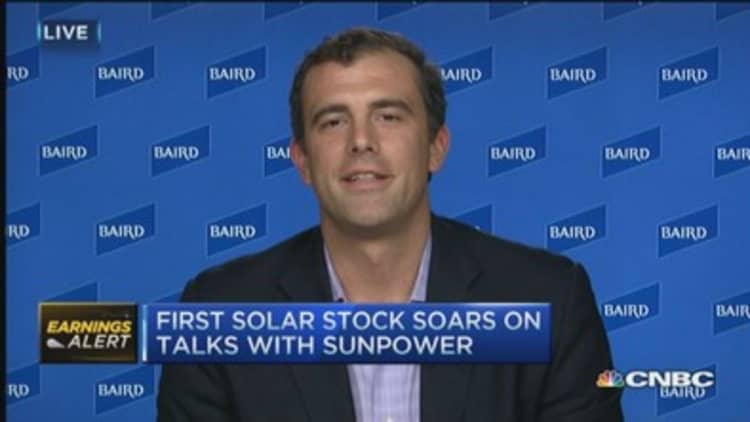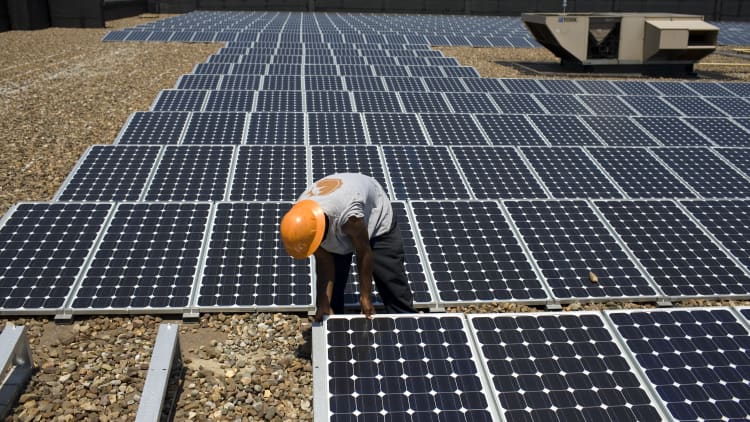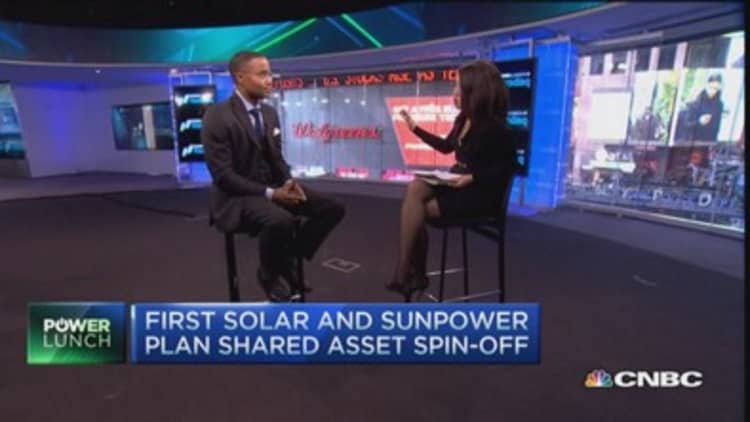


Mary Ellen Cassidy admits she started advocating for solar energy in her hometown of Wheeling, West Virginia, for purely "selfish reasons."
"I got into this so I could find an affordable way to install solar panels in my home," Cassidy said. "But this has become so much more than that."
Cassidy, 66, works with the Wheeling Green Table, a local group that's trying to gather local businesses, churches and homeowners who may be interested in approaching a solar firm for a group discount on solar technology. But a bill that was just passed in West Virginia could put a damper on their idea.
Read More
HB 2201, which has passed but is awaiting Gov. Earl Ray Tomblin's signature, takes away the incentive of investing in solar energy systems in the coal-producing state by allowing utility companies to charge solar customers an extra fee.
"We are not a rich community, and this would really put a damper on solar development," Cassidy said. "We are hoping the governor hears from us, will stop and reconsider."
Demand for solar energy has increased in recent years as the cost of installing the systems has fallen and homeowners and businesses have tried to save money on energy bills. That in turn has prompted utilities to push back against solar's rapid encroachment on the retail market—and they're doing so in Washington and in state legislatures.
At issue is something called "net metering." It's the process by which solar owners can measure the extra power they generate from their panels, and then send it back to the grid at retail rates. That's the way such customers save on their monthly electricity bills.
Utility companies' efforts come at a time when investors are again showing signs of enthusiasm for solar stocks. Shares of First Solar and SunPower were leaping on Tuesday on news that the two plan a joint IPO. Other big solar names, such as Elon Musk's SolarCity, were also rising Tuesday.
Read More Solar firms, power companies battle over 'net metering'
"We've seen utilities across the country try to eliminate solar competition," said Bryan Miller, vice president of public policy for Sunrun, a California-based solar energy company. "They're trying to manipulate the political process, but it's not working."
Still, disgruntled utility companies are taking the fight to Washington. And anti-net metering proposals have cropped up in several states including Arizona, California and Utah.
The utility industry points out that it invests in solar projects itself and presents consumers with its own solar power options, including financing. But it also believes that grid infrastructure costs should be shared among all consumers.
"We believe that public policies must recognize the value of the grid to all customers, and regulatory structures must be applied that sustainably and fairly support both the growth of rooftop solar systems and the grid infrastructure that enable the integration of these technologies," said David Owens, an executive with the Edison Electric Institute, a utillities trade association.
Read More Growth in solar power is white hot: Report
Miller, who is also with the Alliance for Solar Choice, a solar power advocacy group. is betting on public opinion going the way of the solar industry. In addition to increasing demand for solar power, polls show support for renewable energy to be high. In 2012, the Solar Energy Industries Association found that 92 percent of voters believe it is important for the country to develop and use more solar energy.
Groups from across the political spectrum have shown up in support of solar, including the Christian Coalition and the conservative T.U.S.K. (Tell Utilities Solar won't be Killed), which supports solar power on a free markets basis and is chaired by former congressman Barry Goldwater Jr.
"More competition is good for everyone, except the utility monopolies," Miller said. "Eventually they will lose the fight in Washington, become deregulated and broken up, because the markets have to open."
Some utilities boost solar presence
Not all traditional power companies are opposed to solar power. Many utilities are in fact setting up initiatives to work with solar firms and take advantage of the power source themselves.
Newark, New Jersey-based utility company PSE&G, for example, is developing 125 megawatts of solar capacity of its own that it plans to connect directly to the grid. That will be enough to power about 20,000 homes. The company also makes loans to qualified residential and commercial customers to help finance their solar systems.
"We have been progressive in how we view the industry," said Ted Repetti, who manages the PSE&G loan program. "We've been active to try to participate in what is happening."
Read MoreSolar eclipse seen disrupting European power supplies
That is exactly what Ed Marston says needs to happen to the entire utility industry. He is the president of Solar Energy International, a nonprofit organization that trains people in how to use renewable energy.
"Solar and wind have so much momentum behind them," he said.
Marston compared the situation to the land line telephone business at the turn of the century. It didn't disappear all at once but has declined over several years. He predicts a similar fate for big utility companies if they continue to resist renewable energy technologies.
"Resisting solar doesn't make any sense," he said. "The industry has to look ahead and say, 'We are going to lose if we don't adapt quickly.'"


